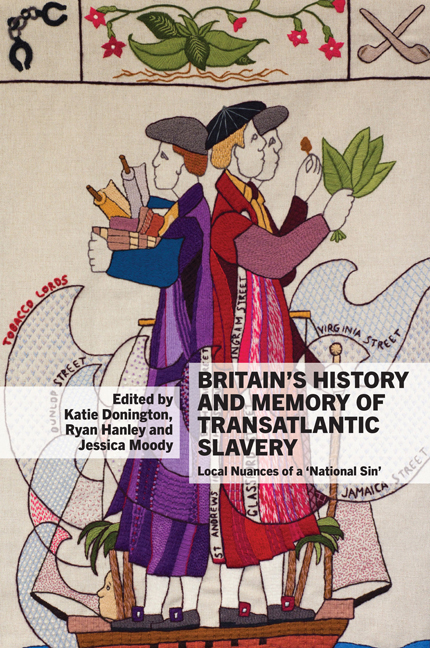Book contents
- Frontmatter
- Contents
- List of Illustrations
- Acknowledgements
- Contributors
- Introduction
- I Little Britain's History of Slavery
- II Little Britain's Memory of Slavery
- 6 Whose Memories? Edward Long and the Work of Re-Remembering
- 7 Liverpool's Local Tints: Drowning Memory and ‘Maritimising’ Slavery in a Seaport City
- 8 Local Roots/Global Routes: Slavery, Memory and Identity in Hackney
- 9 Multidirectional Memory, Many-Headed Hydras and Glasgow
- 10 Making Museum Narratives of Slavery and Anti-Slavery in Olney
- Afterword
- Selected Bibliography
- Index
- Plate section
7 - Liverpool's Local Tints: Drowning Memory and ‘Maritimising’ Slavery in a Seaport City
from II - Little Britain's Memory of Slavery
- Frontmatter
- Contents
- List of Illustrations
- Acknowledgements
- Contributors
- Introduction
- I Little Britain's History of Slavery
- II Little Britain's Memory of Slavery
- 6 Whose Memories? Edward Long and the Work of Re-Remembering
- 7 Liverpool's Local Tints: Drowning Memory and ‘Maritimising’ Slavery in a Seaport City
- 8 Local Roots/Global Routes: Slavery, Memory and Identity in Hackney
- 9 Multidirectional Memory, Many-Headed Hydras and Glasgow
- 10 Making Museum Narratives of Slavery and Anti-Slavery in Olney
- Afterword
- Selected Bibliography
- Index
- Plate section
Summary
Liverpool says much that is unrepeatable [… it] stands as a warning to anyone wishing to paint a national picture by enlarging local tints.
Michael Bentley, The Climax of Liberal PoliticsThis was a port, a great port, and ominously nothing but a port.
Lady Margaret Simey, The Disinherited SocietyIntroduction
The national public memory of Britain's involvement in transatlantic slavery has been framed by a maritime-themed lens; it is confined to the activities and movements of ships across the Atlantic Ocean, having broken memorial ties with more land-based operations and consequences. John Beech has argued that this maritimisation of slavery, as he terms it, has placed a commemorative focus on the transatlantic slave trade, as opposed to enslavement itself, obscuring broader histories of the slavery business, and indeed of its wider economic, social and cultural impacts and legacies on British soil. Much of the weight of Beech's maritimisation argument rests on the location of public exhibitions and museums addressing slavery – which, prior to 2007 at least, were largely to be found in port cities: London, Bristol, Hull and Liverpool. Crucially, this is a pattern which can also be discerned across other former European slave-trading states, where memory work surrounding the history of slavery has also been confined to coastal locations and port cities. In France, the Memorial to the Abolition of Slavery opened in 2012 in Nantes, eighteenth-century France's largest slave-trading port city, and the Musée d'Aquitaine in the country's secondary historic slave-trading port, Bordeaux, opened the permanent exhibition Bordeaux in the Eighteenth Century – Trans- Atlantic Trading and Slaveryin 2009. Orchestrated efforts to maritimise national European histories of transatlantic slavery (and subsequently reduce ‘slavery’ to the ‘slave trade’) through a port city focus can be seen within the location of memory work in the Netherlands (the National Monument to Commemorate the History of Dutch Slavery in Oosterpark, in the port city of Amsterdam). Similar maritimisation has also been achieved through a focus on ships; in Denmark and Norway, the most sustained memory-work has thus far centred on the slave ship Fredensborg, both where it sank in 1768 and the display of its remains, uncovered in 1975.
- Type
- Chapter
- Information
- Britain's History and Memory of Transatlantic SlaveryLocal Nuances of a 'National Sin', pp. 150 - 171Publisher: Liverpool University PressPrint publication year: 2016



